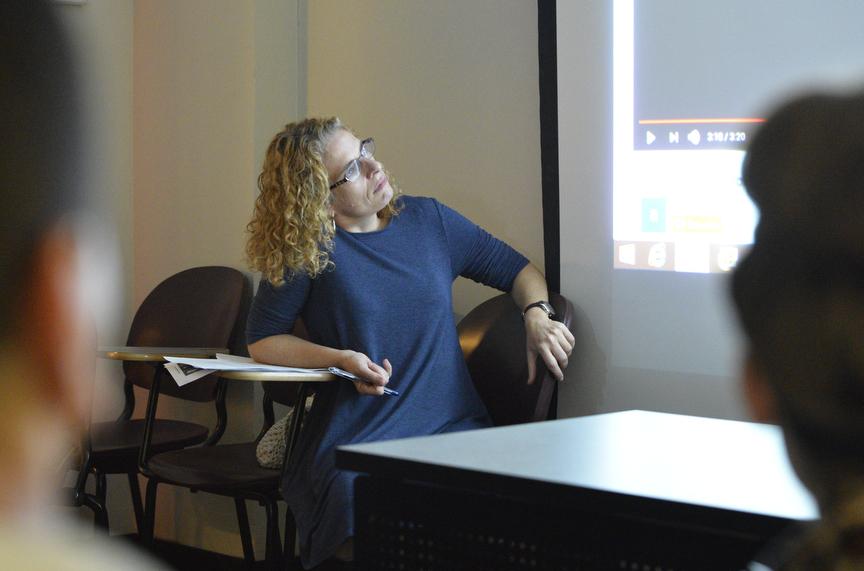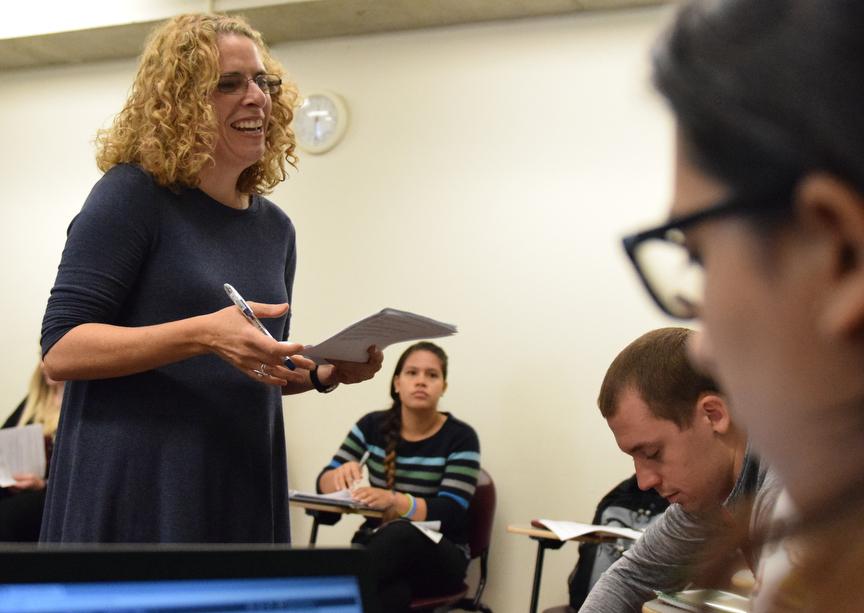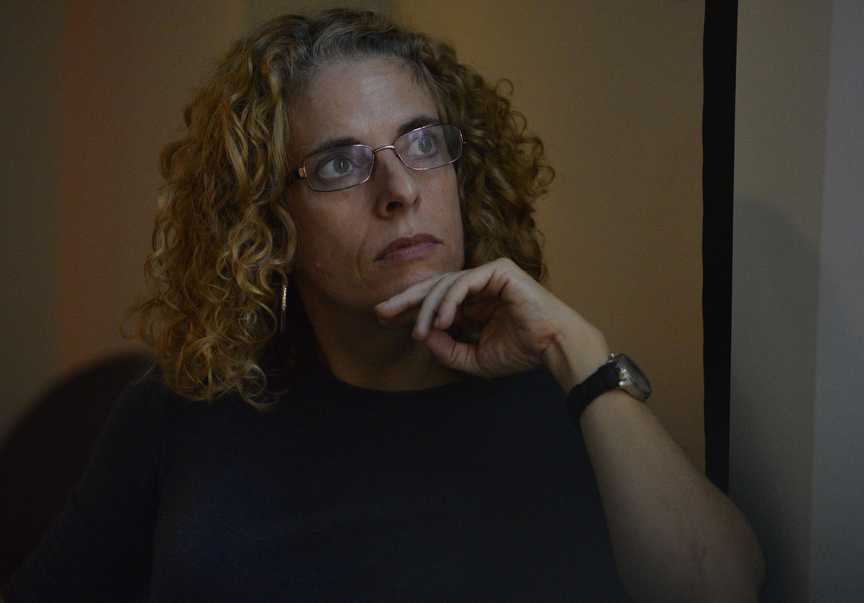Layoffs, resignations, retirements at SIU cause drop in faculty
Associate Professor of Spanish Jennifer Smith, of Carbondale, watches a student presentation Tuesday, Oct. 4, 2016, during her Neoclassicism and Romanticism class in Faner Hall. (Autumn Douglas | @autumn__douglas)
October 5, 2016
While on a July study-abroad trip with his wife and eight students in Spain, Jennifer Smith’s husband received an email most people hope they’ll never get.
He had been laid off.
Smith, who described their reaction as caught off-guard and isolated, said it took some time before she learned that her husband — who was approaching 10 years teaching alongside her as faculty in SIU’s Department of Languages, Cultures, and International Trade — was not the only one left jobless.
Advertisement
In a July 5 message to faculty, interim Chancellor Brad Colwell announced five continuing status non-tenure track (NTT) faculty were being laid off. Roughly 10 non-tenure track faculty did not have their term appointments renewed and about a dozen others received reduced contracts as the result of an almost 10 percent cut to the academic affairs funding.
University officials said the cuts were made because of the state budget stalemate and other factors such as retirements, resignations and poor performance.
More than 150 faculty and staff positions were also left vacant.
‘The initial reaction was shock’
Shannon Lindsay, who became president of the university’s non-tenure track faculty union in July, said more than a few dozen SIU faculty lost their jobs this summer. She said another 91 NTT faculty did not have their contracts renewed by the university.
These job losses are not classified as layoffs because NTT contracts expire on a year-to-year or semester-to semester basis for all NTT faculty who have fewer than the 10 semesters necessary to earn continuing status. But, Lindsay said, a non-renewed contract is still a big deal.
Though NTT can gain more security with the continuing status, it does not protect them like tenured status would, Lindsay said.
Advertisement*
“It doesn’t make sense to me because the faculty members who were non-renewed were such valuable members of the faculty,” said Lindsay, who is also an NTT faculty member in the School of Information Systems and Applied Technology. “This does give the impression we’re less valuable.”
Tenure track and tenured faculty are required to participate in service and research while teaching courses, whereas non-tenure track are only contracted to teach — giving them more classroom time and less job security.
“Even if you could just tell the tenured track faculty to teach more, there are numerous NTT faculty who have special expertise that no tenure-track faculty member happens to have,” said Dave Johnson, president of the Faculty Association, which represents tenured and tenure-track faculty.
Many spouses of tenure-track faculty lost their jobs earlier or had contracts cut back, so a lot of faculty are worried about their job security right now, Johnson said.
“They feel powerless and frustrated and depressed,” he said during a recent interview.
Smith’s husband, who asked not to be named in this story, had taught at the university as a non-tenure track faculty member since 2007. Smith, who is tenured, began teaching at SIU in 2006.
“Because it was done so silently, the initial reaction was shock,” said Smith, who recalled that people in her own department didn’t even know her husband had lost his job. “It just felt sort of like it had happened secretly because there wasn’t a lot of media coverage around it and the actual memo didn’t give a reason for why the people laid off were the ones selected to be laid off.”
Smith also said her family never received words of condolence or sympathy from the administration.
“It’s kind of like mourning,” Smith said of her husband’s job loss. “You go through stages of anger and depression and then acceptance.”

In situations like this, Smith said there are often feelings of shame as the people laid off asks themselves, “what have I done?” In this case, the administration blamed the state’s fiscal crisis and a budget impasse that forced many public Illinois universities to make significant financial cuts.
“About 96 percent of my budget is salaries,” said Meera Komarraju, dean of the College of Liberal Arts and Sciences (COLA), where four of the five layoffs were made. “I have very little else I can give up.”
Komarraju made the layoff decisions for her college. The fifth layoff was in the College of Engineering.
“Any time we’re facing a budget reduction or a budget shortfall, we want to do anything we can to avoid layoffs,” said David DiLalla, associate provost for academic affairs.
DiLalla said not everyone who left was a victim of the budget. Some retired or resigned, or were let go for poor performance, he said.
COLA was significantly affected by the cuts because of its large number of NTT faculty, he said.
“It’s very painful personally and it’s painful institutionally when we have to do that,” said DiLalla, who previously taught in COLA’s psychology department. “It’s not a step that we take lightly.”
Johnson said part of the reason people have been hesitant to speak up is because every time there is a cut, everyone looks around and says, “I’m still here … so I’m just going to keep my head down and hope for the best.”
A drop in faculty
From fall 2006 to fall 2015, the number of full and part-time faculty decreased by 246 professors, according to university data.
The exact numbers of faculty for this semester will be released this month, said DiLalla, though he won’t have exact breakdowns of who left for what reasons because faculty aren’t required to release that information.
SIU had 3,651 faculty and staff on May 1. As of Aug. 18, the count was at 3,229, a decrease of 422 employees, according to information obtained through a Freedom of Information Act request.
Johnson said if more NTT reductions are made, it is likely more tenured faculty will have to pick up heavier teaching loads and set aside less time for service work and research.
“At some point, if you ask them for too much more teaching, then you change the nature of the university to a regional university rather than a national research university as SIU aspires to be,” he said.

For Smith, the language professor, the personnel cuts make it seem like the administration doesn’t care if faculty stay or go. She said many employees are exploring other career options, though it can be difficult for tenured faculty to find a position elsewhere.
“Nobody knows what it’s like until they’ve gone through it,” Smith, who has a 4-year-old daughter, said of her husband’s layoff. “It’s put a huge financial strain, especially since we have a small one.”
MORE: SIU may see $34 million cut from budget
Even though the administration said it didn’t want to lay off people, Smith said the situation makes employees feel unappreciated. She said she thinks campus administrators tried to “gloss things over because they don’t want to lose more students,” but that transparency is the best option.
“It’s hard because you think at this point in your life you’re finally settled,” Smith said. “Now we have to rethink everything.”
Campus editor Anna Spoerre can be reached at [email protected] or on Twitter @annaspoerre.
To stay up to date with all your SIU news, follow the Daily Egyptian on Facebook and Twitter.
Advertisement










robert bowler • Oct 7, 2016 at 10:51 am
I recently graduated with a BS degree in Electrical Engineering from
Southern Illinois University, Carbondale. I was forced to change my major
from Computer Engineering to Electrical Engineering because no CE
professors were willing to help me. I approached a Greek professor to
clarify few questions but unfortunately I was verbally abused and
threatened to get an ‘F’ (Fail) in his course. So, I decided to change my
major and dropped his course. The department is full of arrogant and
abusive professors.
I don’t see any reason to keep those professors by spending tax payer’s
hard earned money when they are not willing to help students. I will tell
everyone not to go to SIUC for any degree that has something to do with
the ECE department.